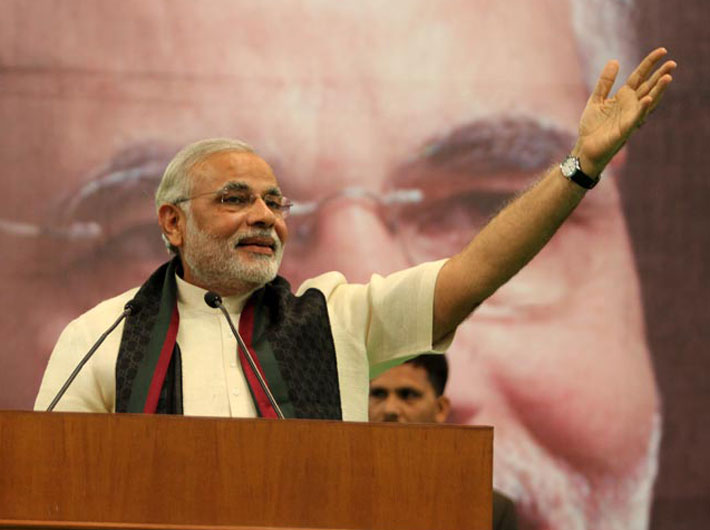Gujarat CM may have risen the BJP ladders ahead of next year’s Lok Sabha polls but for now he is on a wait-and-watch move, and the strategy makes sound political sense
Narendra Modi's rapid evolution from provincial leader to prime ministerial favourite is a testimony both to the failure of the Congress and the middle-class hunger for a hero figure. Disappointed in Manmohan Singh, the upwardly mobile millions are now pinning their hopes on Modi. But for Modi himself, the willy-nilly projection on to the national centrestage is fraught with risk.
Rahul Gandhi's reluctance to be projected as the Congress’s prime ministerial nominee is understandable; battered by scams and an economic slowdown, his government has little to offer the voter. The hype generated by the youth brigade at the Jaipur chintan shivir has died down all too quickly and the party is sceptical about Gandhi’s efforts to run it like a corporation.
Modi's restraint is less understandable, given that he is at present the tallest leader not only in the BJP but across the political landscape — a fact acknowledged by the party leadership that seeks to make him the face of its electoral campaign. Even the RSS leadership, which has no love at all for Modi, has accepted him.
Modesty is not one of Narendra Modi's vices but he seems to have realised that his ascension to the national space may be too big a challenge, and too soon. Ten assembly elections lie between the budget and the general elections. For both Gandhi and Modi, they represent an opportunity to test the electorate's response in their roles as campaign pointsmen, before committing themselves to a mutual contest.
At the very least, Modi would like to wait until after the Karnataka elections, due by May this year. The state represents a Catch-22 situation for Modi. If he is projected as the face of the BJP, he has no choice but to go to Karnataka. And then, if the BJP fails to hang on to its government — as appears likely in the current scenario — it would appear that Modi is not effective outside of Gujarat. This may suit a section of BJP leaders, who would therefore seek to bring him into the limelight.
Later in the year, the BJP faces critical contests in Rajasthan, Madhya Pradesh, Chhattisgarh and Delhi. But with strong chief ministers, or chief ministerial candidates, its prospects in these states are brighter. So none of these states represents a challenge like Karnataka, where the party might just be humiliated by one of its own, former chief minister BS Yeddyurappa.
There are two streams of thought in the BJP regarding Karnataka. The first, propounded by the likes of general secretary Ananth Kumar, is that Yeddyurappa’s split from the party will make no difference to its electoral prospects. His vote bank will be split and he will end up in the wilderness, like Uma Bharti and Kalyan Singh before him.
The second is that Yeddy's Lingayat votebank is intact and will damage the BJP; and so he needs to be brought back into the fold.
BJP president Rajnath Singh subscribes to the latter stream of thought. However, he cannot offer Yeddy the chief ministership, which is his basic demand. In fact, a message was sent to Yeddy from the Rajnath camp that he should congratulate the new party president as a precursor to talks between the two.
But Yeddyurappa flatly refused.
Rajnath has since offered Yeddy a CM of his choice, a role at the centre and deputy chief ministership for his trusted aide and former state power minister, Shobha Karandlaje, though Yeddy is yet to respond.
Modi has carefully kept out of the Karnataka imbroglio, though Yeddy admires him as a leader and keeps in touch with him through a trusted intermediary.
Modi is also carefully building up his equity both within the party and with regional players. Although the JD(U) has refused to comment on Modi as a potential PM, the SAD and AIADMK clearly have no problems. And even as RSS’s number 2, Suresh Joshi, prefers Sushma Swaraj as the PM candidate, number 3 Suresh Soni prefers Rajnath Singh and both RSS number 1 and 2 regard Madhya Pradesh chief minister Shivraj Singh as a potential compromise candidate, it is generally accepted that if Modi cannot be stopped if he manages the numbers through regional alliances.
For now, Modi is waiting to assess the Congress strategy. First, will it advance general elections to 2013, clubbing them with the assembly elections? Or would it like to present another budget before going to polls, thus giving Modi more time to establish himself? Second, will the Congress harp on the communal plank, even as Modi relies on the secular appeal of economic development? Third, will Rahul Gandhi attempt to distance himself from the crony capitalistic policies of his own government and project a pro-poor image while painting Modi as pro-rich?
So while Modi's measured approach may irritate his supporters within and outside the party, as well as the media, the strategy makes sound political sense. The question is whether he will be allowed to follow his own pace.

